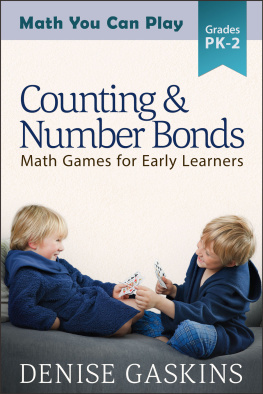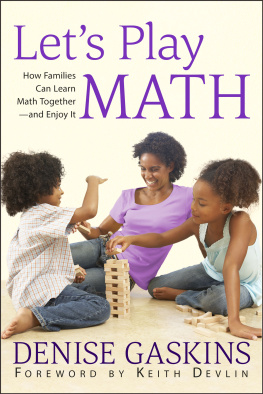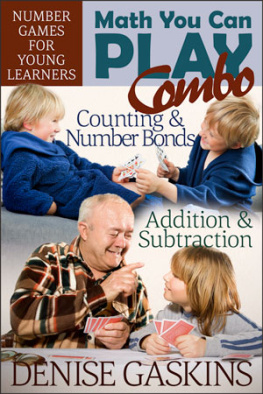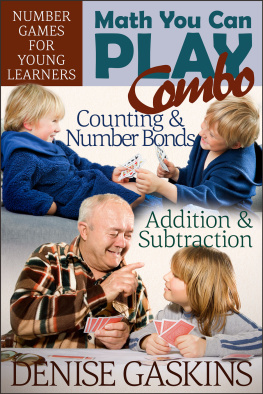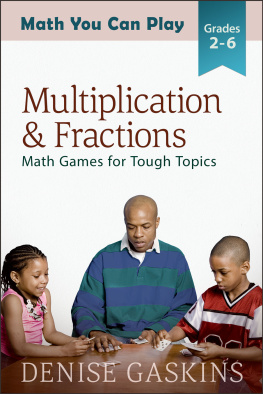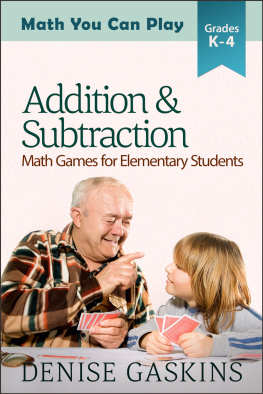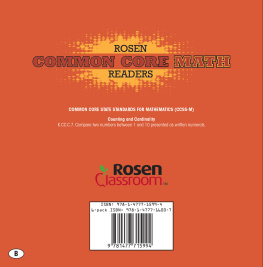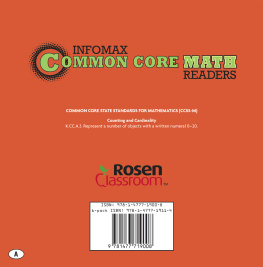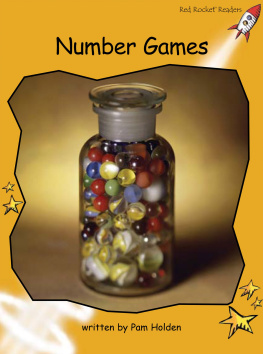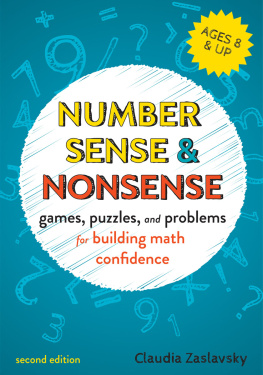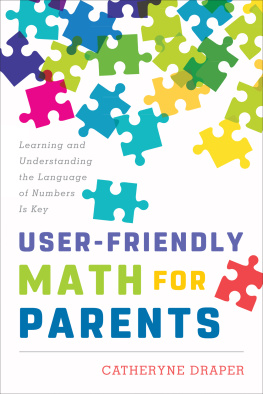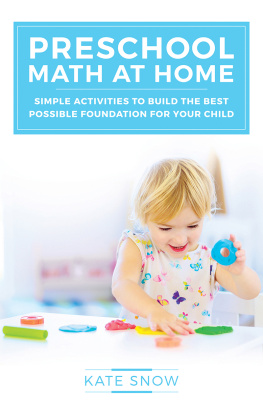Math You Can Play Series
Book One
Counting & Number Bonds
Math Games for Early Learners
Preschool to Second Grade
Denise Gaskins
Copyright 2015 Denise Gaskins
Ebook Version 1.61
All rights reserved.
Tabletop Academy Press
tabletopacademy.net
Readers Love Denises Playful Math Books
These games are great for using and practicing maths skills in a context in which there is some real motivation to do so. I love how they provide opportunities to explore a wide variety of approaches, including number bonds and logical thinking.
My children are always pleased, even excited, when I suggest one of these games. Sometimes they even ask to play them unprompted!
Miranda Jubb, online reader review
It revolutionized our homeschool this year.
Caitlin Fitzpatrick Curley, My-Little-Poppies.com
I have played several of these games with my son, and each one was met with delight on his part and the sharing of delightful conversation about numbers and thinking between us.
I love what Gaskins has to say about working with your children as opposed to simply assigning them work to do. This sums up the philosophy that I try to keep forefront in our home.
Highly, highly recommended.
Amy, Hope Is the Word blog
Wonderful games for elementary students. The author includes a link for printable game boards, ensuring that I don't spend more time making games than playing them. Variations for each game = SO many ways to explore numbers. You will love this book.
Marisa, online reader review
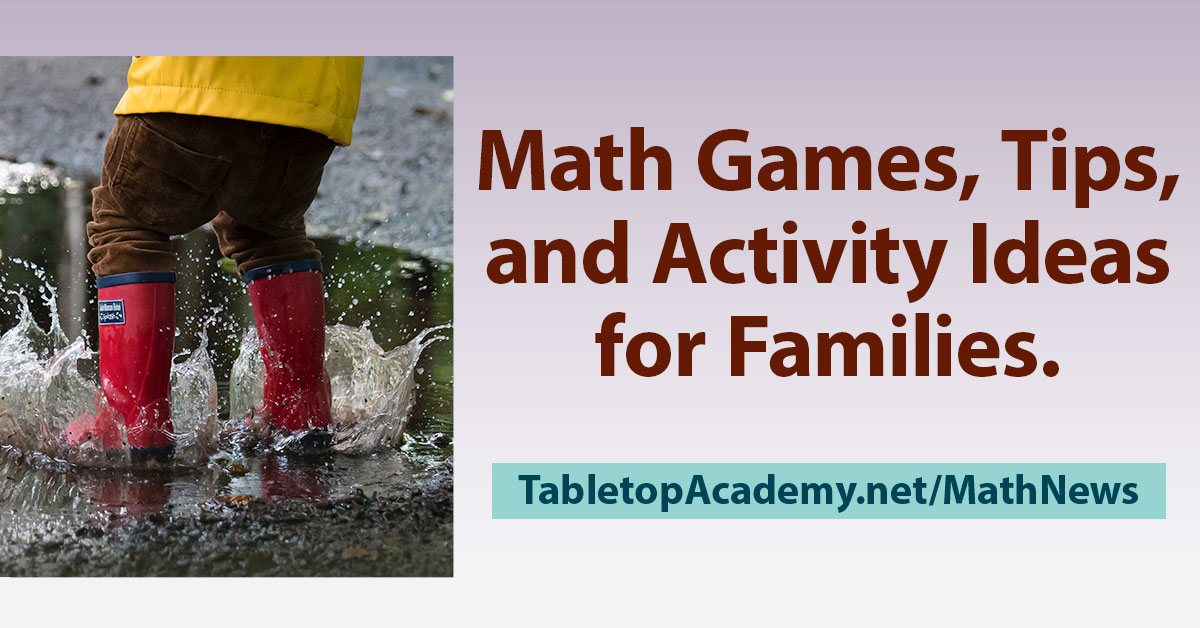
Free Playful Math Newsletter
Want to help your kids learn math? Join my free newsletter for monthly (well, most months) activity ideas. And youll be among the first to hear about new books, revisions, and sales or other promotions.
tabletopacademy.net/mathnews
Contents
Sample Game: Nine Cards
Math Concepts: addition, number bonds for ten.
Players: two or more.
Equipment: one deck of math cards.
How to Play
The first player shuffles the deck and then turns up the top nine cards, placing them face up in a 3 3 array: three rows with three cards in each row. The player captures (removes and keeps) any tens and any pairs of cards that sum to ten, then passes the deck to the next player.
Each player in turn deals out enough cards to fill in the empty spots in the array or, if there are no empty spots to fill, the player covers all nine cards with new ones. Then capture any tens and any pairs that make ten, and pass the deck on.
The game ends when the deck is gone or when there are not enough cards left to fill in the holes in the array. Whoever has collected the most cards wins the game.
[Picture below] Claim the ten and the pairs of cards that add up to ten. Do not take longer sums, like 5 + 2 + 3.
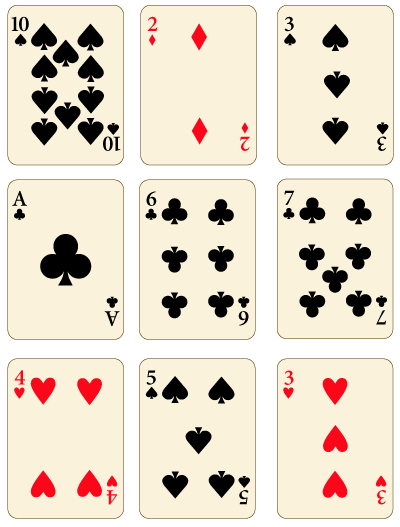
Variation
Concentration (Memory): Lay all the cards out face down on the table in a single layer with no overlaps. On your turn, flip two cards up. If you find a ten or a number bond, take it. If not, leave the cards showing long enough that all the players can see what they are. Then turn them face down before the next players turn.
History
Tens Concentration has always been one of my favorite math games. The face-up Nine Cards version comes from Constance Kamiis Young Children Continue to Reinvent Arithmetic.
Preface to the Math You Can Play Series
The playful, puzzle-solving side of math has always attracted me. In elementary school, calculations were a tedious chore, but word problems provided the opportunity to try out my deductive powers. High school algebra and geometry were exercises in logical reasoning, and college physics was one story problem after anothergreat fun!
As my children grew, I wanted to share this sort of mathematical play with them, but the mundane busyness of everyday life kept pushing aside my good intentions. Determined to make it happen, I found a way to defeat procrastination: invite friends to bring their kids over for a math playdate. We grappled with problems, solved puzzles, and shared games. Skeptical at first, the kids soon looked forward to math club. When that gang grew up and moved on, their younger siblings came to play, and others after them. Sometimes we met weekly, sometimes monthly or just off and on. At our house, at the library, in the park more than twenty years of playing math with kids.
Now Ive gathered our favorite math club games into these Math You Can Play books. They are simple to learn, easy to set up, and quick to play, so even the busiest parents can build their childrens mental math skills and promote logical thinking.
I hope you enjoy these games as much as we have. If you have any questions, I would love to hear from you.
Denise Gaskins
LetsPlayMath@gmail.com
Section I

A Strategy for Learning
Introduction
How to Use This Book
There should be no element of slavery in learning. Enforced exercise does no harm to the body, but enforced learning will not stay in the mind. So avoid compulsion, and let your childrens lessons take the form of play.
Plato
If a perfect teacher developed the ideal teaching strategy, what would it be like?
An ideal teaching strategy would have to be flexible, working in a variety of situations with students of all ages.
It would promote true understanding and reasoning skills, not mere regurgitation of facts.
It would prepare children to learn on their own.
Surely the ideal teaching strategy would be enjoyable, perhaps even so much fun that the students dont realize they are learning.
And it would be simple enough that imperfect teachers could use it, too.
This is idle speculation, of course. There is no ideal teaching strategy that works with every student in every subject. But for math, at least, there is a wonderful way to stimulate our childrens number skills and encourage them to think: we can play games.
Math games push students to develop a creatively logical approach to solving problems. When children play games, they build reasoning skills that will help them throughout their lives. In the stress-free struggle of a game, players learn to analyze situations and draw conclusions. They must consider their options, change their plans in reaction to the other players moves, and look for the less obvious solutions in order to outwit their opponents.
Even more important, games help children learn to enjoy the challenge of thinking hard. Children willingly practice far more arithmetic than they would suffer through on a workbook page. Their vocabulary grows as they discuss options and strategies with their fellow players. Because their attention is focused on their next move, they dont notice how much they are learning.
And games are good medicine for math anxiety. Everyone knows it takes time to master the fine points of a game, so children can make mistakes or get stuck without losing face.
If your child feels discouraged or has an I cant do it attitude toward math, try taking him off the textbooks for a while. Feed him a strict diet of games. It will not be long before his eyes regain their sparkle. Beating a parent at a math game will give any child confidence. And if youre like me, your kids will beat you more often than you might want to admit.
Next page
